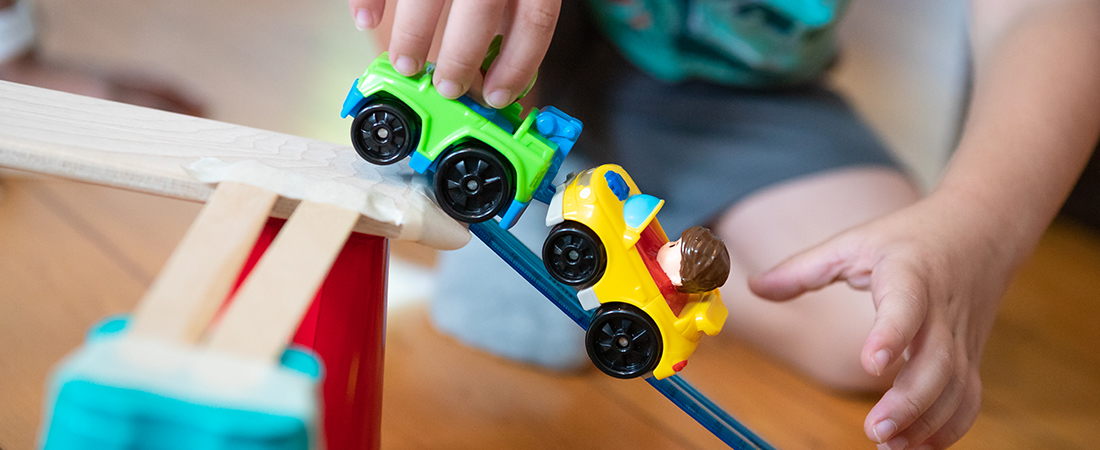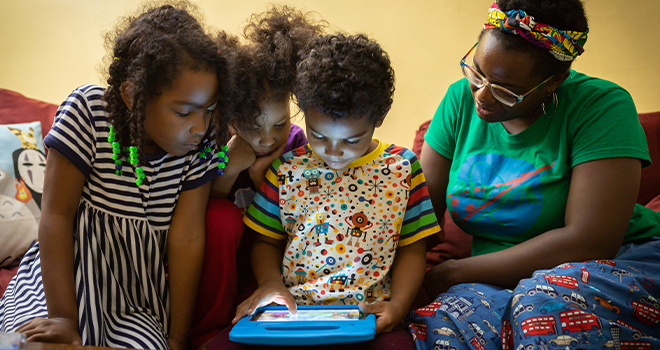Tapping, Swiping, and Learning Science

Digital apps, games, and videos hold great potential to support early science and engineering learning for young children. But until now, there’s been little research on the real-life impact of using those media tools. Can children’s experiences in a digital environment lead to real-world science and engineering learning?
New research shows they can.
In a study titled Early Science and Engineering: The Impact of The Cat in the Hat Knows A Lot About That! on Learning, researchers from EDC and SRI conducted a randomized trial of children’s use of digital media from PBS KIDS The Cat in The Hat Knows a Lot About That!™ program. They found that tablet-based games and videos, as well as embedded guidance for how to do hands-on science activities, had positive effects on children’s physical science knowledge and their ability to engage with science and engineering practices.
“Parents have a lot of choices, and a lot of questions, about which types of educational media their young children should use,” says EDC’s Megan Silander, who led the research. “This study shows media can help young children learn important science concepts and practices. Most exciting, the findings help us better understand effective ways to get children from low-income families doing and learning science at scale and at a relatively low cost.”
Findings
Researchers randomly assigned 454 four- and five-year-olds from low-income households to receive a tablet with either The Cat in the Hat Knows a Lot About That! resources or other educational media. Children used the tablet for approximately one hour per week for eight weeks. Both before and after the study, researchers collected data on the children’s science and engineering knowledge and practices.
“This study shows media can help young children learn important science concepts and practices”
—EDC’s Megan Silander
The researchers found that exposure to The Cat in the Hat Knows a Lot About That! media resources had a positive effect on children’s understanding of core physical science ideas of matter and force and on their interest and engagement. They also found that access to The Cat in the Hat Knows a Lot About That! had a positive effect on children’s broader understanding of physical science concepts and science and engineering practices, their ability to sort objects by material properties, and their science-related vocabulary.
Implications
While previous research has shown that young children often struggle to transfer knowledge from videos and digital games to the real world, the study’s findings suggest that time spent engaging with videos and digital games can be productive and educational.
Educators and parents can interpret these findings to mean that digital media can help young children learn science and engineering concepts if the digital media:
- Is developmentally appropriate
- Targets important school readiness concepts and skills
- Encourages active learning
- Is paired with hands-on science activities
Educational media producers can also look to this study to identify what makes for high-quality, learning-focused content for young children, who benefit from careful design that aligns with learning goals.
Finally, the size of the impacts of The Cat in the Hat Knows a Lot About That! on learning is also notable. The cost to scale up access to the digital resources is relatively low, especially when compared to more typical efforts to improve science education, such as professional development, which are expensive to offer at a broad scale.
The upshot? When done well, educational media can be a cost-effective, helpful tool in improving young children’s engagement in, and knowledge of, science.
The study was commissioned by the U.S. Department of Education’s Ready To Learn initiative. The Corporation for Public Broadcasting and PBS are supported through this initiative, and EDC and SRI International are their long-standing evaluation partners.
